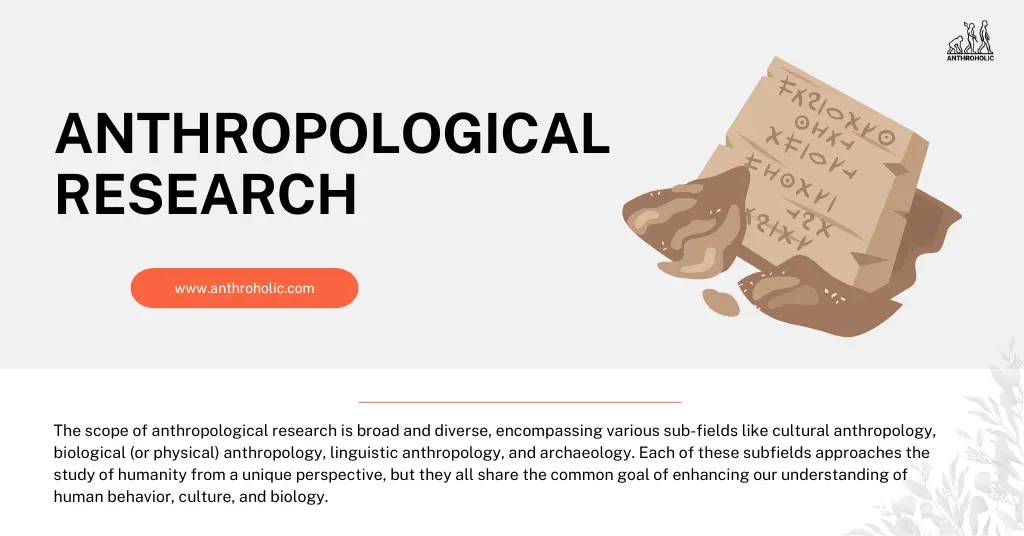AI Answer Evaluation Platform Live Now. Try Free Answer Evaluation Now
Anthropological Research
The scope of anthropological research is broad and diverse, encompassing various sub-fields like cultural anthropology, biological (or physical) anthropology, linguistic anthropology, and archaeology. Each of these subfields approaches the study of humanity from a unique perspective, but they all share the common goal of enhancing our understanding of human behavior, culture, and biology.

Importance and Relevance in Today’s World
The importance of anthropological research lies in its capacity to foster understanding among different cultural backgrounds, addressing global issues such as conflict, health disparities, environmental degradation, and social injustice [1]. Its methodological emphasis on immersive fieldwork and participant observation allows for nuanced, in-depth understanding of cultures and practices that can bridge cultural gaps and promote empathy [2].
In the context of globalization and increasing cultural interaction, the importance of anthropology has grown. Anthropological research plays a crucial role in informing policies, promoting cultural understanding, and contributing to development initiatives. It is particularly valuable in a multicultural and diverse society, helping to facilitate cross-cultural understanding and respect [3].
Historical Development of Anthropological Research
Origin and Evolution
The birth of anthropology as a formal discipline can be traced back to the 19th century, emerging alongside the scientific revolution and the age of exploration. It was heavily influenced by the intellectual movements of the time, particularly Enlightenment thinking which emphasized empirical evidence and rationality. Initial anthropological inquiries were largely based on observations and accounts of explorers, missionaries, and colonial administrators [4].
Anthropology evolved significantly in the 20th century, shifting from an emphasis on “armchair anthropology” based on second-hand accounts to direct fieldwork and participant observation, a shift largely attributed to the works of Bronislaw Malinowski and Franz Boas.
Major Theorists and Their Contributions
Franz Boas, often referred to as the ‘father of American anthropology‘, emphasized cultural relativism and the importance of holistic and detailed ethnographic research. He rejected the then-dominant paradigm of cultural evolutionism, which posited a linear progression of cultures from ‘primitive’ to ‘advanced’.
Bronislaw Malinowski, another foundational figure, is known for his pioneering work in ethnographic fieldwork and his functionalist approach to culture, viewing cultural practices and institutions in terms of their roles in satisfying basic human needs [5].
Claude Lévi-Strauss, a leading figure in structural anthropology, emphasized the deep structures of mind which he believed influenced the patterns of human behavior and culture [6].
Shifts in Research Focus Over Time
Early anthropological research was often focused on non-Western, ‘exotic’ cultures, viewed from a perspective of ethnocentrism. The shift to cultural relativism led to more respectful and nuanced understanding of diverse cultures [7].
Post-WWII, the decolonization process influenced anthropology to become more self-reflective and critical of its own biases and colonial roots, leading to the emergence of postmodern and interpretive anthropology.
In recent years, the discipline has expanded to include an increased focus on applied anthropology, engaging with contemporary issues such as globalization, migration, health, and environment.
Core Principles and Concepts of Anthropological Research
- Cultural Relativism: Cultural Relativism is a principle established by Franz Boas which posits that a person’s beliefs and activities should be understood in the context of their own culture. This principle is a methodological tool to prevent researchers from applying their own cultural biases to their interpretations.
- Ethnocentrism: Ethnocentrism is the tendency to view the world through the lens of one’s own culture, often leading to a biased perspective and judgment of other cultures as inferior or abnormal. The recognition and mitigation of ethnocentrism is a critical part of anthropological research, helping to ensure more accurate, respectful, and nuanced understanding of cultures under study.
- Holism: Holism in anthropology refers to the discipline’s commitment to considering the full scope of human life – culture, biology, history, and language – across time and space when studying a particular group or individual. This holistic perspective allows anthropologists to grasp the interconnections and complexity of human societies and behavior.
Methodologies in Anthropological Research
- Ethnography: Ethnography is a foundational research method in anthropology, involving immersive, long-term fieldwork within a specific cultural community. This methodology, popularized by scholars like Bronislaw Malinowski, involves the detailed description and analysis of a particular culture, usually based on firsthand observation. The goal of ethnography is to capture cultural phenomena from the perspective of the study population.
- Comparative Method: The Comparative Method in anthropology is the systematic comparison of different cultures to identify commonalities and differences. It is often used to test hypotheses or theories about cultural practices or phenomena. By examining the variety of human societies, anthropologists can draw inferences about human nature and social and cultural life.
- Participant Observation: Participant observation is a key research strategy in anthropology where the researcher takes part in the daily activities, rituals, interactions, and events of the group being studied, as one of the means of learning the explicit and tacit aspects of their life routines and culture. This method provides rich, in-depth data and facilitates a nuanced understanding of the culture under study.
- Ethnohistory: Ethnohistory combines historical and ethnographic approaches to understand and interpret the histories of non-Western peoples from their own perspectives. Ethnohistorians use a variety of sources, including oral histories, archaeological findings, archival documents, and ethnographic data, to trace the historical experiences and cultural continuity of a particular group or culture.
Ethical Dilemmas
Anthropologists often confront a number of ethical dilemmas during their research, especially when working with vulnerable populations. Issues of informed consent, privacy, and exploitation are of paramount concern. Ethnographic fieldwork often involves sensitive cultural, political, and personal matters, raising questions about what information should be disclosed and how data should be collected, used, and reported.
Debates and Controversies
Anthropological research has sparked several debates and controversies. The role of the anthropologist and their relationships with the communities they study, issues of representation and voice, and the political and ethical implications of their work are often contentious topics. More recently, the discipline has seen debates around the ‘decolonization’ of anthropology and how to address the discipline’s historical complicity with colonialism.
Directions for Future Research
The future of anthropological research lies in addressing emerging global challenges and understanding complex phenomena such as migration, climate change, digital cultures, and global health disparities. The discipline is increasingly interdisciplinary and collaborative, and future research will likely continue to bridge gaps between academic theory and real-world application.
Moreover, as the world becomes more connected, the importance of understanding human diversity and cross-cultural interactions is becoming even more critical. Anthropology is well-positioned to provide insights into these vital issues.
References
[1] Eriksen, T. H. (2015). Small places, large issues: An introduction to social and cultural anthropology (4th ed.). Pluto Press.
[2] Geertz, C. (1973). The Interpretation of Cultures. Basic Books.
[3] Appadurai, A. (1996). Modernity at Large: Cultural Dimensions of Globalization. Minneapolis: University of Minnesota Press.
[4] Harris, M. (1968). The Rise of Anthropological Theory: A History of Theories of Culture. Thomas Y. Crowell Company.
[5] Malinowski, B. (1922). Argonauts of the Western Pacific: An Account of Native Enterprise and Adventure in the Archipelagoes of Melanesian New Guinea. Routledge. https://ia802608.us.archive.org/25/items/argonautsofweste00mali/argonautsofweste00mali.pdf
[6] Lévi-Strauss, C. (1955). The Structural Study of Myth. Journal of American Folklore, 68(270), 428-444.
[7] Boas, F. (1887). The Study of Geography. Science, 9(214), 137-141.




